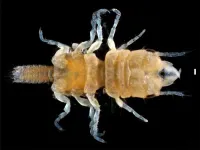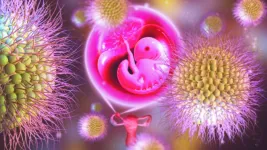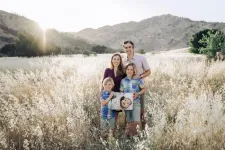(Press-News.org) Jakarta … San Francisco … Shanghai … Phoenix … Houston.
These major cities and others around the globe have many similarities, but they share one particular commonality that is concerning for residents. They are among the global cities most affected by climate change.
While each of these cities has proven resilient for centuries, urban planners, community leaders and civil engineers continue to address their many environmental challenges. In preparing for these cities’ future, however, it might be more expedient to revisit the distant past for inspiration.
A recent article in the Proceedings of the National Academy of Sciences (PNAS) explores how ancient Mesoamerican civilizations fared against environmental threats and provides examples of how modern metropolises can learn from their successes.
“Mesoamerican Urbanism Revisited: Environmental Change, Adaptation, Resilience, Persistence, and Collapse” was published in the latest edition of PNAS and also is available to review on PubMed Central. Its authors include a who’s who of anthropological archaeology and urbanism scholars from across the globe.
“There are some lessons to be learned from many regions within Mesoamerica,” said its lead author Diane Z. Chase, University of Houston senior vice president for academic affairs and provost.
Both Diane Chase and her husband Arlen Chase (longtime archaeologists, research collaborators and spouses) are frequent visitors to the Maya archaeological site of Caracol in Belize. That region and others, she said, holds many clues to addressing some of the problems faced by today’s cities.
“When that city was at its height, the city planning in and of itself was exceedingly well done,” she said. “They were doing some things that we are still talking about … green cities, walkable cities.”
Prehispanic Mesoamerica included areas of Mexico, Belize, Guatemala and El Salvador. In addition to Caracol, Mesoamerican cities examined within the article include Chunchucmil, Monté Alban and Teotihuacan in Mexico and Tikal in Guatemala.
These and other Mesoamerican cities prospered despite a lack of modern technologies and without basic resources such as wheeled transport or domesticated animals such as oxen, mules or donkeys to carry loads. Chase and her fellow authors maintain that despite history often depicting the fall of Maya cities, their resiliency for centuries is often overlooked.
“While the causes of the Classic lowland Maya collapse remain a subject of coalescing debate, sizeable changes in the populations of many cities occurred,” Chase and co-authors stated in the article. “These changes in population have largely blinded scholars to the remarkable successes of lowland Maya cities that persisted, adapted, and flourished for many centuries and were then replaced by smaller cities that subsequently arose and flourished.”
Such resiliency can be attributed to enhanced infrastructure that included roads, access to markets and agricultural terracing (or sloped planes with sections landscaped into flattened platforms for farming). Likewise, these cities supported advanced socio-economic systems that included structured governance, institutions and social norms.
Ultimately, these cities withstood a number of environmental challenges such as drought, earthquakes, heavy rains, hurricanes and rising sea levels. Many of these meteorological conditions were detected by researchers who examined stalagmites, shells and other items found within these ancient sites.
Drought has long been considered to be a factor in the demise of Mesoamerican cities. According to Arlen Chase, professor in UH’s Comparative Cultural Studies Department, that is indeed a myth. He said that cities such as Teotihuacan experienced significant growth during a period of severe drought. In Caracol, the city was already largely abandoned when that area of Belize was affected by lack of rain.
“The correlation between the population sizes within these cities and the consistency of these sites doesn’t have anything to do with drought,” he said. “These cities actually were quite resilient.”
Another myth, he said, focused on the concept of compact and dense urbanism as constituting all cities, which is largely a western concept. A form of dispersed urbanism was prevalent within Mesoamerica (and in other parts of the world) that varied from city to city. One trend observed by the Chases and their collaborators was that collective societies (or those that were largely democratic) were the most successful.
“At their peaks, most Mesoamerican cities were prosperous and sustainable, often with a form of collective governance,” the authors stated within the article. “Governance, however, was fickle and was subject to shift between more collective and more autocratic systems over the course of history. Also particularly striking in terms of the abandonments of Mesoamerican cities―and opposed to earlier understandings―is that most of their collapses are associated with a rejection of these successful adaptations for strategies more focused on autocracy and inequality, in which there was only limited wealth sharing.”
In determining social structures and governance within these ancient sites, the Chases and fellow researchers analyzed the bones of residents within Caracol and other sites. Chemical elements within these human remains can offer clues to a person's diet (which provides insights on where people lived or their level or wealth). Additionally, artifacts and the size of living spaces can offer insight on wealth, power and social status.
Co-author Gary M. Feinman, MacArthur Curator of Mesoamerican, Central American, and East Asian Anthropology at Chicago’s Field Museum of Natural History, said there are many lessons to be learned from Mesoamerica. In facing the challenges of the future, it’s essential to look to the past, he said.
He added that the PNAS article is a first step in helping clear the air regarding any misconceptions regarding the perceived failures of Mesoamerican cities and truly spotlights the resiliency of their residents.
“Part of this article is trying to correct the misbelief that the Mesoamerican cities were riddled with collapse, that rulers were purely despotic and that there was no such thing as economic growth and prosperity,” Feinman said. “That’s why this era is not looked at as a source of information. By clearing up some of these misbeliefs that are broadly held, we can make this information more accessible to city planners and policy makers.”
Feinman believes that one of the biggest lessons to be learned from the success of Mesoamerican cities is from its residents. Those community members, who worked tirelessly to adapt to a changing environment and react to natural disasters without technology, are models for contemporary communities, he said.
“These cities speak to the great potential of human cooperation,” he said. “When people share a goal, they can do amazing things.”
In addition to Diane Z. Chase, Arlen F. Chase and Gary M. Feinman, contributors to this PNAS article are as follows: Jose Lobo, clinical associate professor in the School of Sustainability at Arizona State University; David M. Carballo, professor of anthropology and archaeology at Boston University; Adrian S.Z. Chase, institute postdoctoral fellow and Department of Anthropology postdoctoral scholar at the University of Chicago’s Mansueto Institute for Urban Innovation; Scott R. Hutson, professor and anthropology department chair at the University of Kentucky; Alanna Ossa, associate professor and anthropology chair at the State University of New York, Oswego; Marcello Canuto, professor of anthropology at Tulane University; Travis W. Stanton, professor of anthropology at the University of California, Riverside; L.J. Gorenflo, Stuckeman Chair in Design and professor of landscape architecture at Pennsylvania State University; Christopher A. Pool, professor of anthropology at the University of Kentucky; Barbara Arroyo, research associate at Universidad Francisco Marroquin ‘s Museo Popol Vuh in Guatemala City; Rodrigo Liendo Stuardo, senior investigator at Universidad Nacional Autónoma de México’s Instituto de Investigaciones Antropológicas; and the late Deborah L. Nichols, who served as professor of anthropology at Dartmouth University.
END
Mesoamerica a model for modern metropolises
New study suggests clues to urban resiliency lie within ancient cities
2023-07-25
ELSE PRESS RELEASES FROM THIS DATE:
What can central Utah’s earthquake ‘swarms’ reveal about the West’s seismicity?
2023-07-25
Most of the earthquakes rumbling under the West’s Great Basin come in surges, clustered together in time and place. Scientists call these seismic groups “swarms,” which are a distinct category from the numerous aftershocks following a big shake, such as the 5.7 magnitude Magna quake of 2020 on the Wasatch Fault.
Rather than getting spread out evenly over time, many of these small, often imperceptible quakes strike a region in a short period of time, say a few days or weeks.
Central Utah has been the stage for dozens of earthquake swarms that have been recorded over the past 40 years by an ever-expanding network of seismic arrays managed by the University ...
Encouraging Latinx youth to embrace ethnic pride can enhance their well-being
2023-07-25
Encouraging Latinx adolescents of Mexican origin to embrace their ethnic pride, cultural values, and connections to their cultural community contributes to positive development and better adjustment during adolescence, a new University of California, Davis, psychology study suggests.
Moreover, researchers said, cultural preservation can help Latinx youth cope with adverse life experiences and social threats such as racism and discrimination.
The study results were published this month in ...
Chapman University climate scientist finds new way to measure the Earth’s ability to offset carbon emissions
2023-07-25
A Chapman University scientist and his colleagues have determined how the Earth responds as it heats up due to climate change.
The scientists say a warming world calls for a new approach in detecting how much carbon dioxide comes out of ecosystems when the temperature changes — which tells us how well plants and soil can alleviate damage by removing carbon pollution from the atmosphere. The study is the first to find the temperature-carbon dioxide release relationship at the landscape level.
Their ...
Scientists discover new isopod species in the Florida Keys
2023-07-25
An international team of scientists from the University of Miami Rosenstiel School of Marine, Atmospheric, and Earth Science and the Water Research Group from the Unit for Environmental Sciences and Management at the North-West University in South Africa have discovered a new species of marine cryptofauna in the Florida Keys. Cryptofauna are the tiny, hidden, organisms that make up the majority of biodiversity in the ocean.
The roughly three-millimeter-long isopod is one of only 15 species from the genus Gnathia currently known in the region.
The newly discovered species, Gnathia jimmybuffetti, which is a member of a group of crustaceans called gnathiid isopods, were collected ...
New drug delivery system shows promise in treatment of life-threatening pregnancy condition
2023-07-25
PORTLAND, Ore. – Researchers in the Oregon State University College of Pharmacy have developed a drug delivery system that shows promise for greatly enhancing the efficacy of the medicine given to women with the life-threatening condition of ectopic pregnancy, which occurs when a fertilized egg implants somewhere other than the lining of the uterus.
Olena Taratula of the OSU College of Pharmacy, and Maureen Baldwin and Leslie Myatt of Oregon Health & Science University led a team that used a mouse model to show ...
Experts call for independent inquiry into Canada’s COVID-19 response
2023-07-25
At first glance, Canada appears to have responded adequately to the covid-19 emergency, but beneath the surface lie major pandemic failures, warns a series of articles published by The BMJ today.
The BMJ Canada Covid Series provides a critical analysis of what worked and what didn’t in Canada’s covid-19 response and calls for a national independent review to learn lessons and ensure accountability for the past and future preparedness.
The articles, written by leading clinicians and researchers representing 13 institutions across Canada, highlight long-standing weaknesses ...
Bisexual people experience worse health outcomes than other adults in England – national study of more than 835,000 people
2023-07-25
Self-reported data from lesbian, gay or bisexual (LGB) patients shows these groups have poorer health outcomes compared to those who identify as heterosexual, but bisexual people disproportionally experience the worst outcomes in England.
These new findings, published today in the peer-reviewed journal The Journal of Sex Research, indicate that bisexual people face additional health disparities within an already marginalised community.
Experts, from the Brighton and Sussex Medical School and Anglia Ruskin University who led the analysis of more than 835,000 adults in England, suggests the disparities could result from unique prejudice and discrimination ...
Family loses child to necrotizing enterocolitis and publishes “Forever Our Little One,” a storybook for bereaved families
2023-07-25
Davis, CA – Mother-daughter duo Jennifer Canvasser and Leslie Napolitano have published Forever Our Little One, a storybook for bereaved families. Jennifer is the executive director of the Necrotizing Enterocolitis (NEC) Society, which she founded after her son Micah tragically died from complications of NEC. Leslie is an artist and illustrator who helped care for her grandson Micah during his time in the neonatal and pediatric intensive care units. Jennifer wrote the storybook for families ...
Curbing waste improves global food security but has limited environmental benefits
2023-07-24
Irvine, Calif., July 24, 2023 – Reducing waste is one way to help combat hunger around the world, but stricter control over food loss and waste does not lead to better environmental outcomes, according to researchers at the University of California, Irvine and the University of Colorado Boulder.
In a paper published recently in Nature Food, the scientists stress that curbing food spoilage increases the amount of produce in markets, which leads to lower costs. Cheaper food encourages people to buy and eat more, offsetting the lowering of greenhouse gas ...
Highlights from the journal CHEST®, July 2023
2023-07-24
Glenview, Illinois – Published monthly, the journal CHEST® features peer-reviewed, cutting-edge original research in chest medicine: Pulmonary, critical care and sleep medicine and related disciplines. Journal topics include asthma, chest infections, COPD, critical care, diffuse lung disease, education and clinical practice, pulmonary vascular disease, sleep, thoracic oncology and the humanities.
The July issue of the CHEST journal contains 49 articles, including clinically relevant research, reviews, case series, commentary and more. Each month, the journal ...
LAST 30 PRESS RELEASES:
Machine learning tool can predict serious transplant complications months earlier
Prevalence of over-the-counter and prescription medication use in the US
US child mental health care need, unmet needs, and difficulty accessing services
Incidental rotator cuff abnormalities on magnetic resonance imaging
Sensing local fibers in pancreatic tumors, cancer cells ‘choose’ to either grow or tolerate treatment
Barriers to mental health care leave many children behind, new data cautions
Cancer and inflammation: immunologic interplay, translational advances, and clinical strategies
Bioactive polyphenolic compounds and in vitro anti-degenerative property-based pharmacological propensities of some promising germplasms of Amaranthus hypochondriacus L.
AI-powered companionship: PolyU interfaculty scholar harnesses music and empathetic speech in robots to combat loneliness
Antarctica sits above Earth’s strongest “gravity hole.” Now we know how it got that way
Haircare products made with botanicals protects strands, adds shine
Enhanced pulmonary nodule detection and classification using artificial intelligence on LIDC-IDRI data
Using NBA, study finds that pay differences among top performers can erode cooperation
Korea University, Stanford University, and IESGA launch Water Sustainability Index to combat ESG greenwashing
Molecular glue discovery: large scale instead of lucky strike
Insulin resistance predictor highlights cancer connection
Explaining next-generation solar cells
Slippery ions create a smoother path to blue energy
Magnetic resonance imaging opens the door to better treatments for underdiagnosed atypical Parkinsonisms
National poll finds gaps in community preparedness for teen cardiac emergencies
One strategy to block both drug-resistant bacteria and influenza: new broad-spectrum infection prevention approach validated
Survey: 3 in 4 skip physical therapy homework, stunting progress
College students who spend hours on social media are more likely to be lonely – national US study
Evidence behind intermittent fasting for weight loss fails to match hype
How AI tools like DeepSeek are transforming emotional and mental health care of Chinese youth
Study finds link between sugary drinks and anxiety in young people
Scientists show how to predict world’s deadly scorpion hotspots
ASU researchers to lead AAAS panel on water insecurity in the United States
ASU professor Anne Stone to present at AAAS Conference in Phoenix on ancient origins of modern disease
Proposals for exploring viruses and skin as the next experimental quantum frontiers share US$30,000 science award
[Press-News.org] Mesoamerica a model for modern metropolisesNew study suggests clues to urban resiliency lie within ancient cities



